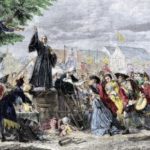Do your students know what they’re free to say online? At school? On a public street corner? From censorship to cyberbullying, the First Amendment and the freedoms it protects are as hotly contested as ever. This EDCollection explores 16 free speech debates ranging from the founding of our nation to recent headlines to illustrate what free speech actually means, where it comes from, and how far it can go. Whether you’re a social studies teacher looking for a complete unit or an English teacher looking to spend a single class period on free expression, there’s something for everyone. Free registration required.
The Campus Speaker: A Case Study in Free Speech
Use this classroom-ready lesson to examine free-expression issues surrounding a controversial speaker invited to appear at UC Berkeley. We provide questions to help guide your students on if and when offensive speech should be banned, and what are the competing groups and interests.
The Great Awakening

This short video examines the flurry of religious expression which spread throughout the colonies during the 1740’s and 1750’s. Led by individuals such as George Whitfield and Jonathan Edwards, the Great Awakening cut across racial, class, and geographic barriers to create an incipient sense of nationalism. Professor Jeffry Morrison contends that the popular religiosity of this movement contributed directly to the popular constitutionalism of the 1770’s.
Introducing the First Amendment
Students will inductively discover the First Amendment by reading and analyzing newspapers. They will discuss various circumstances involving the First Amendment, and so understand that in certain instances – libel, publication of national secrets, etc. – there is a limit to the freedoms expressed in the First Amendment.
Freedom of Assembly: The Right to Protest
This lesson will focus on freedom of assembly, as found in the First Amendment. Students will consider the importance of the right to assemble and protest by analyzing cases where First Amendment rights were in question. Using the case National Socialist Party of America v. Village of Skokie, students will consider if the government is ever allowed to control the ability to express ideas in public because viewpoints are controversial, offensive, or painful. Students will use primary sources and Supreme Court cases to consider whether the courts made the correct decision in the National Socialist Party v. Skokie case. Students will be able to form an opinion on the essential question: Is the government ever justified to restrict the freedom to assemble?
Constitution Day Across the Country
Various free, downloadable lessons across grades K through 12 to facilitate providing educational programs on Constitution Day. These interactive lessons teach about the development and evolution of the U.S. Constitution. Students are able to express themselves through discussion and debates while engaging in various activities.